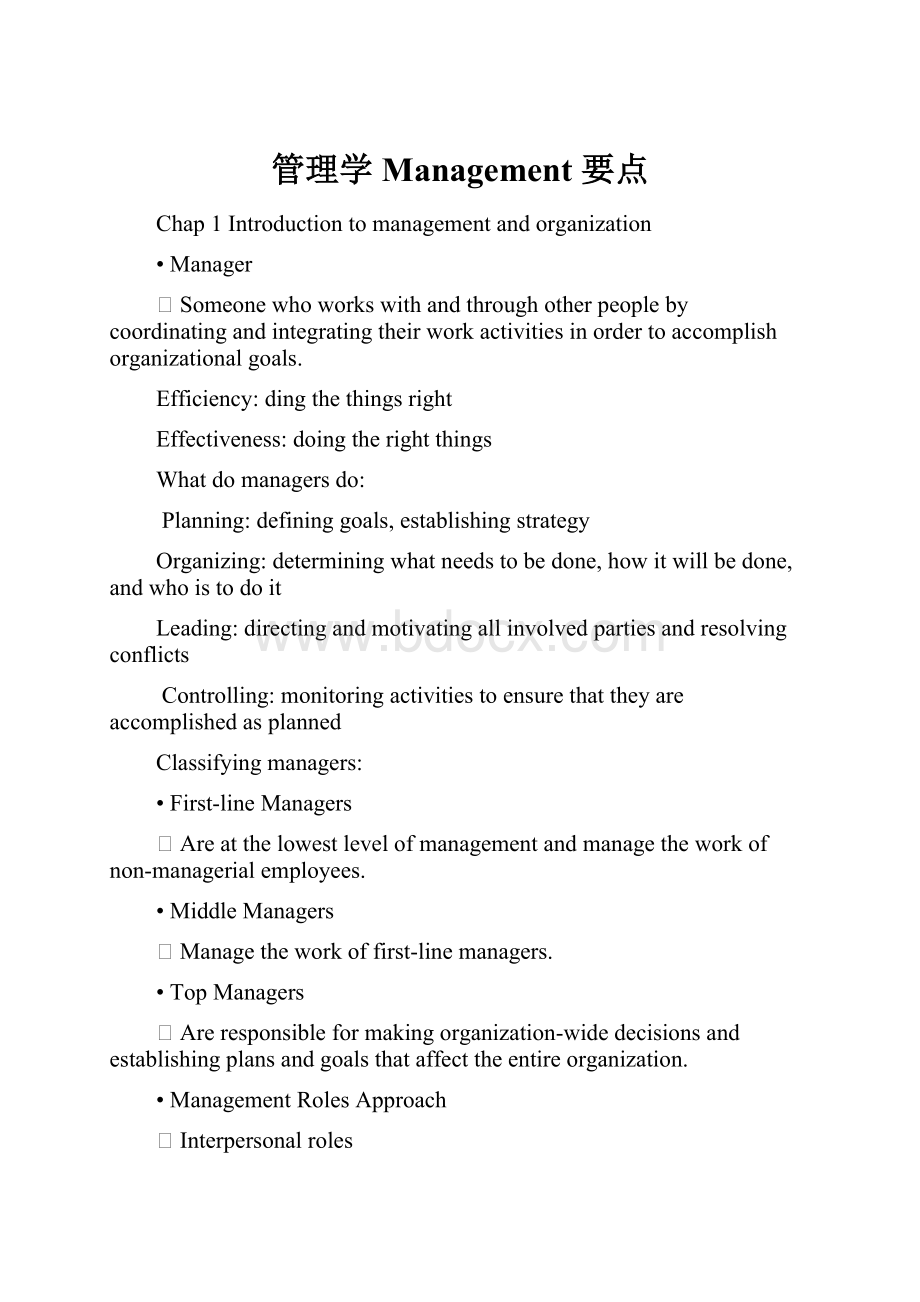管理学 Management 要点.docx
《管理学 Management 要点.docx》由会员分享,可在线阅读,更多相关《管理学 Management 要点.docx(33页珍藏版)》请在冰豆网上搜索。

管理学Management要点
Chap1Introductiontomanagementandorganization
•Manager
ØSomeonewhoworkswithandthroughotherpeoplebycoordinatingandintegratingtheirworkactivitiesinordertoaccomplishorganizationalgoals.
Efficiency:
dingthethingsright
Effectiveness:
doingtherightthings
Whatdomanagersdo:
Planning:
defininggoals,establishingstrategy
Organizing:
determiningwhatneedstobedone,howitwillbedone,andwhoistodoit
Leading:
directingandmotivatingallinvolvedpartiesandresolvingconflicts
Controlling:
monitoringactivitiestoensurethattheyareaccomplishedasplanned
Classifyingmanagers:
•First-lineManagers
ØAreatthelowestlevelofmanagementandmanagetheworkofnon-managerialemployees.
•MiddleManagers
ØManagetheworkoffirst-linemanagers.
•TopManagers
ØAreresponsibleformakingorganization-widedecisionsandestablishingplansandgoalsthataffecttheentireorganization.
•ManagementRolesApproach
ØInterpersonalroles
vFigurehead,leader,liaison
ØInformationalroles
vMonitor,disseminator,spokesperson
ØDecisionalroles
vDisturbancehandler,resourceallocator,negotiator
•SkillsApproach
ØTechnicalskills
vKnowledgeandproficiencyinaspecificfield
ØHumanskills
vTheabilitytoworkwellwithotherpeople
ØConceptualskills
vTheabilitytothinkandconceptualizeaboutabstractandcomplexsituationsconcerningtheorganization
▪Chapter3OrganizationalCultureandtheEnvironment:
TheConstraints
TheManager:
OmnipotentorSymbolic?
▪Omnipotent全能的ViewofManagement
Theviewthatmanagersaredirectlyresponsibleforanorganization’ssuccessorfailure.
▪SymbolicViewofManagement
Theviewthatmanagershaveonlyalimitedeffectonsubstantiveorganizationaloutcomesbecauseofthelargenumberoffactorsoutsidetheircontrol.
Realitysuggestsasynthesis
▪OrganizationalCulture
ØAsystemofsharedmeaningsandcommonbeliefsheldbyorganizationalmembersthatdetermines,inalargedegree,howtheyacttowardseachother.
ØValues,symbols,rituals,myths,andpractices
Strongversusweakculture
Strongculture:
orgsinwhichthekeyvaluesareintenselyheldandwidelyshared.
Socialization:
theprocessthatadaptsemployeestotheorganization’sculuture.
Howemployeeslearnculture
Stories,ritual仪式典礼materialsymbols,language,
▪SourcesofOrganizationalCulture
ØTheorganization’sfounder
■Visionandmission(IBM)
ØPastpracticesoftheorganization
■Thewaythingshavebeendone
ØThebehavioroftopmanagement
▪ContinuationoftheOrganizationalCulture
ØRecruitmentoflike-mindedemployeeswho“fit”
Socializationofnewemployeestohelpthemadapttotheculture
DefiningtheExternalEnvironment
▪ExternalEnvironment
ØTheforcesandinstitutionsoutsidetheorganizationthatpotentiallycanaffecttheorganization’sperformance.
▪ComponentsoftheExternalEnvironment
ØSpecificenvironment:
externalforcesthathaveadirectandimmediateimpactontheorganization.
ØGeneralenvironment:
broadeconomic,socio-cultural,political/legal,demographic,technological,andglobalconditionsthatmayaffecttheorganization.
Thegeneralenvironmentisthebroadexternalconditionsthatmayaffecttheorganization.
StakeholderRelationships
▪Stakeholders
ØAnyconstituenciesintheorganization’sexternalenvironmentthatareaffectedbytheorganization’sdecisionsandactions
▪WhyManageStakeholderRelationships?
ØItcanleadtoimprovedorganizationalperformance.
ØIt’sthe“right”thingtodogiventheinterdependenceoftheorganizationanditsexternalstakeholders.
Chapter4ManaginginaGlobalEnvironment
▪Hofstede’sframeworkforassessingcultures(p.90)
ØPowerdistance:
ameasureoftheextenttowhichasocietyacceptstheunequaldistributionofpowerininstitutionsandorgs.权力距离
ØIndividualismversuscollectivism个人主义集体主义
Individualism:
thedegreetowhichpeopleinacountryprefertoactasindividuals.
Collectivism:
asocialframeworkinwhichpeopleexpectothersintheirgroupstolookafterthemandtoprotectthem.
ØQuantityoflifeversusqualityoflife
Quantityoflife:
thedegreetowhichvaluessuchasassertiveness,theacquisitionofmoneyandmaterialgoods,andcompetitionprevail.
Qualityoflife:
anationalcultureattributethatemphasizesrelationshipsandconcernforothers.
ØUncertaintyavoidance不确定性规避
Thedegreetowhichpeopletolerateriskandpreferstructuredoverunstructuredsituations.
ØLong-termversusshort-termorientation
Anationalcultureattributethatemphasizesthefuture,thrift,andpersisitence.
Chapter5Socialresponsibilityandmanagerialethics
WhatIsSocialResponsibility?
●TwoOpposingViewsofSocialResponsibility
●Classicalview-management’sonlysocialresponsibilityistomaximizeprofits
●MiltonFriedman-managers’primaryresponsibilityistoservetheinterestsofthestockholders(ownersofthecorporation).
▪doing“socialgood”addstothecostofdoingbusiness
▪costshavetobepassedontoconsumers
●TheSocioeconomicView(社会经济学)
●Management’ssocialresponsibilitygoesbeyondmakingprofitstoincludeprotectingandimprovingsociety’swelfare.
FromObligationtoResponsivenesstoResponsibility
●SocialObligation(legalitybased)
●Theobligationofabusinesstomeetitseconomicandlegalresponsibilitiesandnothingmore.
●SocialResponsiveness(selfwillingnessbased)
●Thecapacityofafirmtoadapttochangingsocietalconditionsthroughthepracticaldecisionsofitsmanagersinrespondingtoimportantsocialneeds.
●SocialResponsibility(servicescopebased)
Afirm’sobligationsasamoralagentextendsbeyonditslegalandeconomicobligations,tothepursuitoflong-term
ManagerialEthics
●EthicsDefined
●Therulesandprinciplesthatdefinerightandwrongconduct.(asystemofvaluesandbeliefs)——ethics
●Businessethicsrelatetohowabusinessorganizationconductsitsaffairs
●Bothpersonalandbusinessethicsvaryamongpeople,situationsandcultures
●Managerialethicsarestandardsofbehaviorthatguidemanagersintheirwork
FourViewsofEthics
●Theutilitarianview:
ethicaldecisionsaremadeonthebasisoftheiroutcomesorconsequences
●Therightsview:
Concernedwithrespectingandprotectingindividuallibertiesandprivacy.
●Thetheoryofjusticeview:
Organizationalrulesareenforcedfairlyandimpartiallyandfollowalllegalrulesandregulations.
●Theintegrativesocialcontractstheory:
decisionsshouldbebasedonempirical完全根据经验的andnormative标准化的factors
FactorsThatAffectEthicalandUnethicalBehavior——stageofmoraldevelopment
Chapter6decisionmaking:
theessenceofthemanager’sjob
MakingDecisions:
Rationality,BoundedRationality,andinstitution.
Rationaldecisionmaking:
describesthechoicesthatareconsistentandvalue-maximizingwithinspecifiedconstraints.
Assumptionsofrationality理性假设
Boundedrationality有限合理性
Satisficing:
acceptanceofsolutionsthatare“goodenough”
Escalationofcommitment:
anincreasedcommitmenttoapreviousdecisiondespiteevidencethatItmayhavebeenwrong.
Roleofinstitution直觉的作用
ProblemsandDecisions
•StructuredProblems——ProgrammedDecision
Straightforward,familiar,andeasilydefinedproblems.
Arepetitivedecisionthatcanbehandledbyaroutineapproach.(policy,procedure,rule)
•UnstructuredProblems——NonprogrammedDecisions
Problemsthatareneworunusualandforwhichinformationisambiguousor
incomplete.
Auniquedecisionthatrequiresacustuom-madesolution.
Integration
CHAPTER7FOUNDATIONSOFPLANNING
◆Typesofplanning
—Informal:
•notwrittendown,short-termfocus;specifictoanorganizationalunit.(都在脑子里)
—Formal:
●written,specific,andlong-termfocus,involvessharedgoalsfortheorganization.
Wemeanformalplanninginthisbook.
◆StrategicPlans策略规划——plansthatapplytoehentireorganization,establishtheorganization’soverallgoals,andseektopositiontheorganizationintermsofitsenvironment.
◆OperationalPlans操作规划——plansthatspecifythedetailsofhowtheoverallgoalsaretobeachieved.
Long-TermPlans——planswithatimeframebeyondthreeyear.
Short-TermPlans——planscoveringoneyearofless.
SpecificPlans特殊性计划——plansthatareclearlydefinedandthatleavenoroomforinterpretation.
DirectionalPlans方向性计划——plansthatareflexibleandthatsetoutgeneralguidelines.
Single-useplan——aone-timeplanspecificallydesignedtomeettheneedsofauniquesituation.
Standingplans——ongoingplansthatprovideguidanceforactivitiesperformedrepeatedly.
ApproachestoEstablishingGoals
◆TraditionalGoalSetting目标设定理论
◆ManagementByObjectives(MBO)
MBO的要素:
目标明确Goalspecificity
目标必須是可以测量和评估的具体目标
◆參与式决策participativedecisionmaking
管理者和员工共同设定目标,決定如何达成目标。
◆时限清楚anexplicitperformance/evaluationperiod
每个目标都必須在預定的时间內达成
◆绩效回馈feedback
提供员工进度回馈,以达成具体目标。
Criticismsofplanning
1)planningmaycreaterigidity
2)planscan’tbedevelopedforadynamicenvironment.
3)Formalplanscan’treplaceinstitutionandcreativity.
Chapter8StrategicManagement
StrategicManagement:
thesetofmanagerialdecisionsandactionsthatdeterminesthelong-runperformanceofanorg.
Whyisstrategicmanagementimportant?
1.Itresultsinhigherorganizationalperformance.
2.Itrequiresthatmanagersexamineandadapttobusinessenvironmentchanges.
3.Itcoordinatesdiverseorganizationalunits,helpingthemfocusonorganizationalgoals.
4.Itisverymuchinvolvedinthemanagerialdecision-makingprocess.
TheStrategicManagementProcess
Step1:
identifyingtheorg’scurrentmission,objectivesandstrategies
Step2:
extern